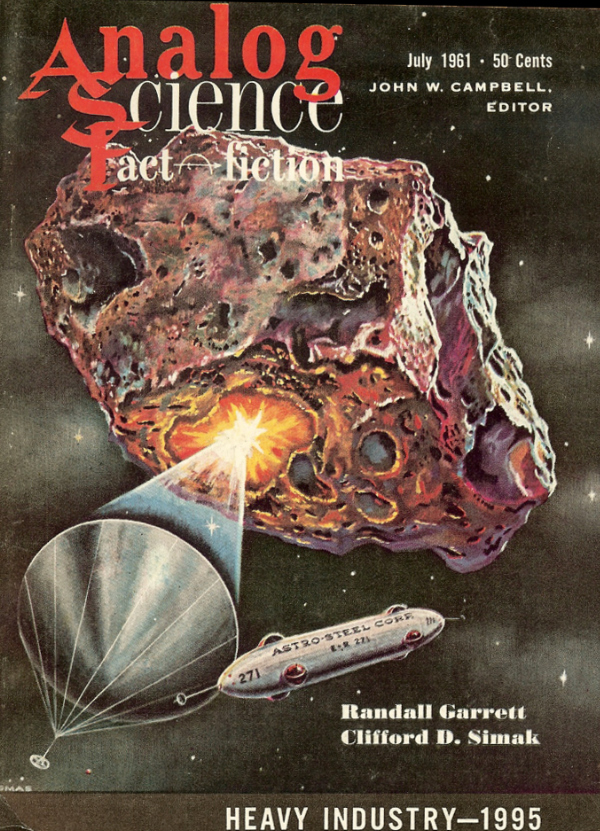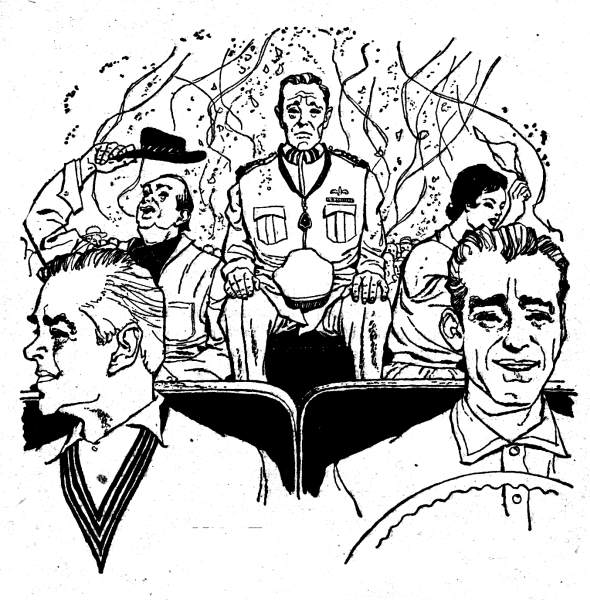
by Gideon Marcus
We live in increasingly tumultuous times (or maybe we are just better informed about them). A war is heating up in Vietnam, an even significant enough to have produced fictional characters who have experienced it (e.g. Linc, the veteran in Route 66; Oscar from Heinlein's new serial, Glory Road).

There's a war waging in our country, too, as Blacks fight for the rights they are due as humans. They march, they protest, they are attacked, and sometimes they are killed. The President recently sent a Civil Rights Bill to Congress, but its future is far from certain.

When the news gets unbearable (or if you are a soldier on either of these front lines and need a break) science fiction and fantasy provide welcome respites. They offer completely new worlds to explore that may have their own problems, but at least they're different ones. Or the stories posit futures/alternaties where vexing issues have been solved.
I find myself increasingly seeking out this refuge as the world gets scarier. This month's last science fiction digest, the July 1963 Analog, afforded me several hours of peace when I needed it. Perhaps it will do the same for you.

The Big Fuel Feud (Part 2 of 2), by Harry B. Porter

Even as a rocket scientist, I found Porter's increasingly dry comparison of solid vs. liquid fuels to be interminable. Campbell needs contributors who will be less textbook, more Asimov (or Ley). Two stars.
The Ethical Engineer (Part 1 of 2), by Harry Harrison

When we last saw Jason dinAlt, the psychic gambler with a galactic range, he had brought a tepid peace between the city-dwellers and the country folk on the lethal world of Pyrrus. The latter had managed to live with the increasingly hostile life forms on that death world rather than wage an increasingly futile arms race against it.
Pyrrus barely figures in this new serial, as dinAlt is kidnapped in Chapter One by a religious fanatic bent on taking Jason back to galactic civilization to face crimes against decency. On the way, their ship is crippled, and the two must become unlikely allies to survive on yet another harsh world.
It's not as good as Deathworld, and it could have just as easily starred another character. That said, it picks up as it goes, and I found myself wanting more at the half-way break. I appreciate that Jason dinAlt, like Laumer's Retief, appears to be Black. Three stars trending upwards.
New Apples in the Garden, by Kris Neville

In an increasingly technological world, the engineer becomes increasingly essential. So what happens when people stop seeing slip-stick pusher as a desirable career? Kris Neville describes a dark future of slow but inexorable decay (with the unspoken subtext made overt in the final illustration). I don't know that I buy this premise given how heavily the sciences are boosted these days, but it is evocatively drawn. Three stars.
A Knyght Ther Was, by Robert F. Young

Robert Young has written a lot of great stuff, but these days, his work tends to be really bad, usually some sort of in-joke based on an obvious literary reference (usually something obscure like the Book of Genesis). This time, his story features a fellow named Thomas Mallory who goes back to England in 542 A.D. Can you guess what he finds? I'll give you a clue — it's not a decaying Romano-British/Welsh society under attack by colonizing Saxons.
Worse yet, and you'll see this a mile away, Mallory is THE Mallory. Yes, bootstraps galore in a tediously predictable tale that doesn't even have the virtue of being funny. Two stars, and that's being generous. Read the original, or the ur-document penned by Geoffrey of Monmouth.
New Folks' Home, by Clifford D. Simak

Cliff Simak, master of bucolic SF, has got a serial running in Galaxy right now called Here gather the stars, in which aliens set up a galactic way station in a rural part of America. New Folk's Home is very similar, thematically, in which an old man, making his last vacation to the backwoods of his youth, discovers a beautiful new house in the middle of nowhere. Why is it there, and how could it be tied to him? Is it an intrusive eyesore, or just the retirement spot he was looking for?
I especially enjoy Simak because his stuff tends to have happy endings, and his aliens are benevolent. Good stuff, as always. Four stars.

Thanks to the Harrison and the Simak, I have a more positive feeling toward this issue (and the world) than the issue's 2.6 star rating would normally command. It's not the best magazine of the month, or even near the top — that prize goes to Fantastic (3.3), followed by Worlds of Tomorrow and Fantasy and Science Fiction (3.1). Even IF got a higher score (2.8), and it had one of the best stories (Down to the Worlds of Men, by Alexei Panshin). New Worlds was slightly better, too (2.7). Only Amazing was worse, and it was a LOT worse (2.1). So there was lots to enjoy this month to take you out of the miseries of the world.
On the other hand, one misery continues to intrude. Women wrote just two out of the thirty-seven contributions. I've been told women aren't just interested, and the editors print the best things they can find. Why should editors bother to especially solicit women when their jobs are busy enough as it is?
In reply, I present Exhibit A: Jack Sharkey, whose work fills half of two magazines this month, garnering a whopping two stars between them. Surely, we can do better than that if we bring in some new blood. We literally can't do worse.
Speaking of Alexei Panshin, the great young author, himself, has answered my letter and offered up an article describing the birth of his first (and most excellent story). Look forward to it in just a couple of days!












